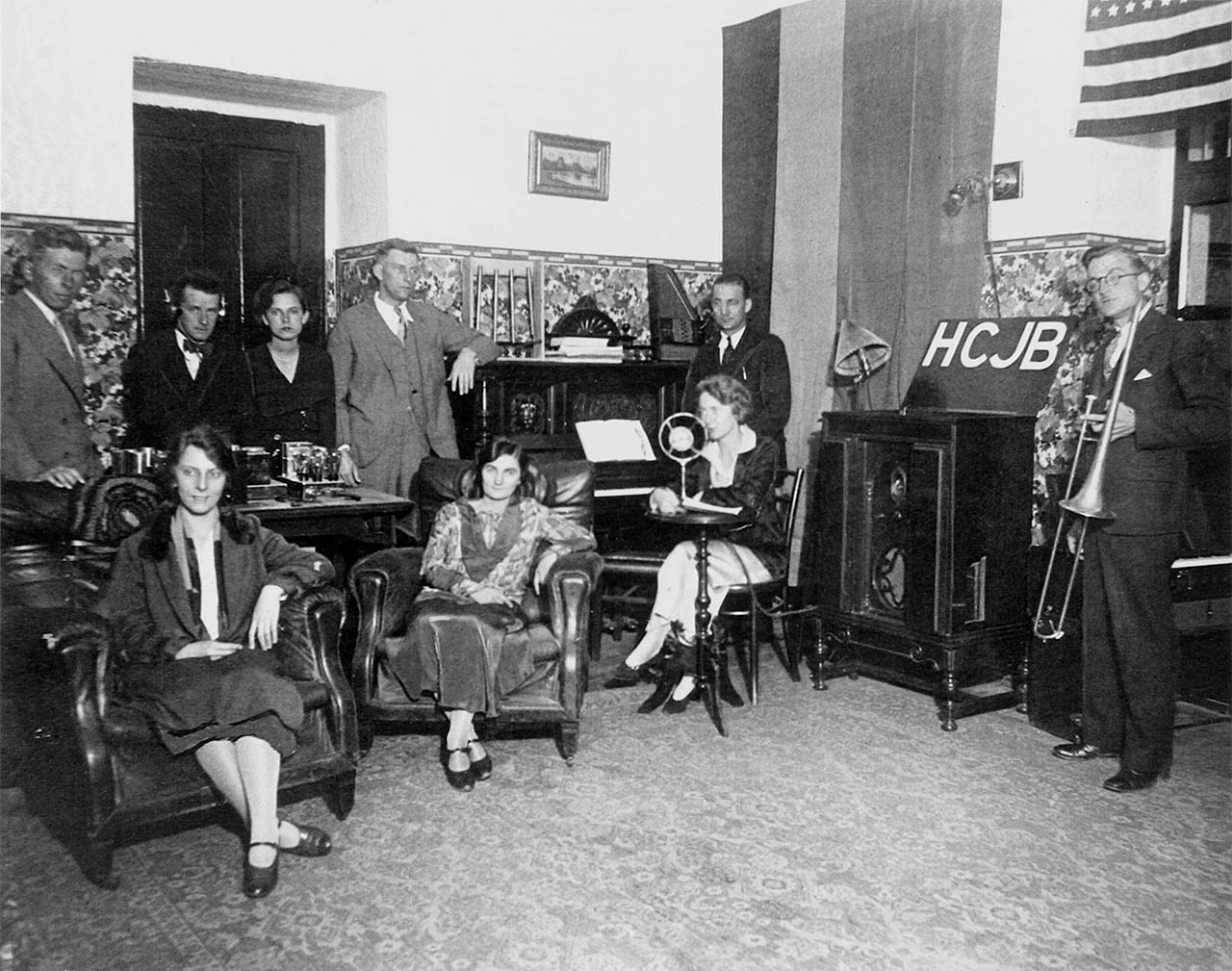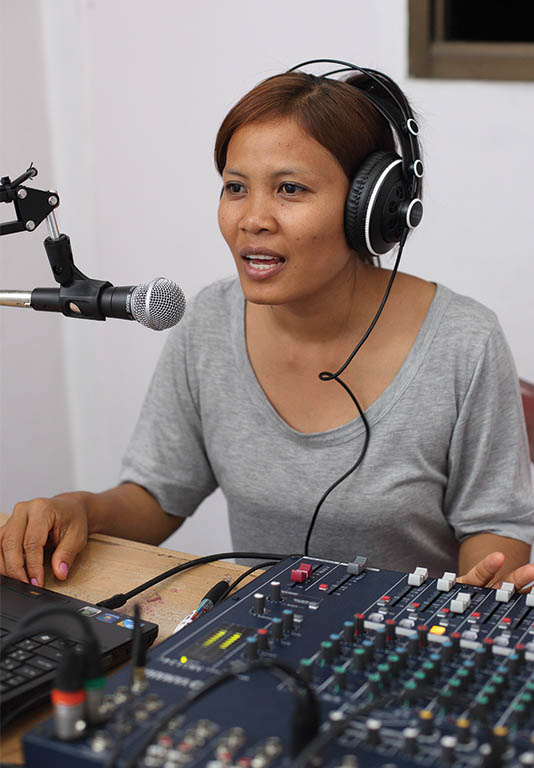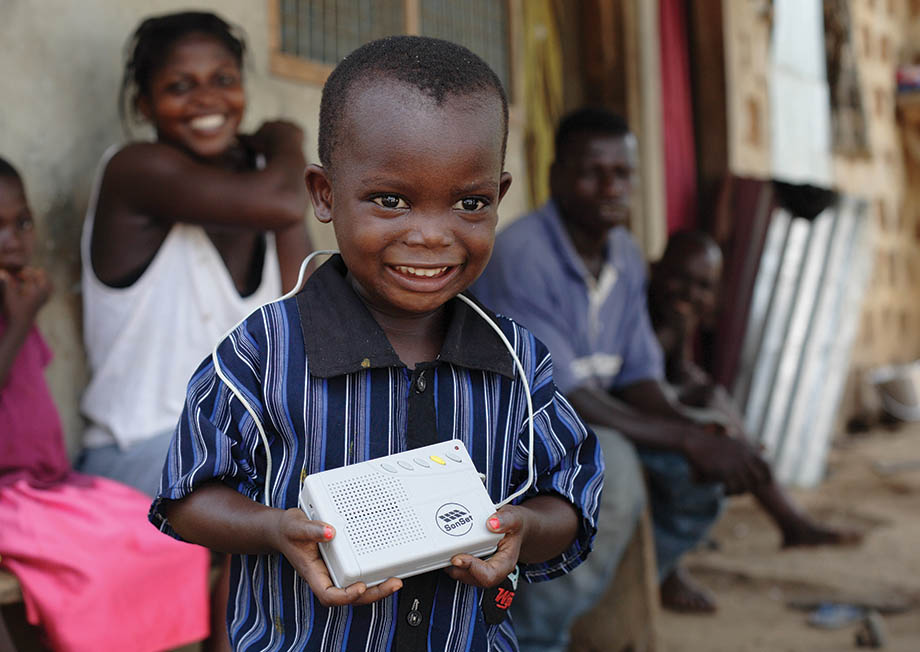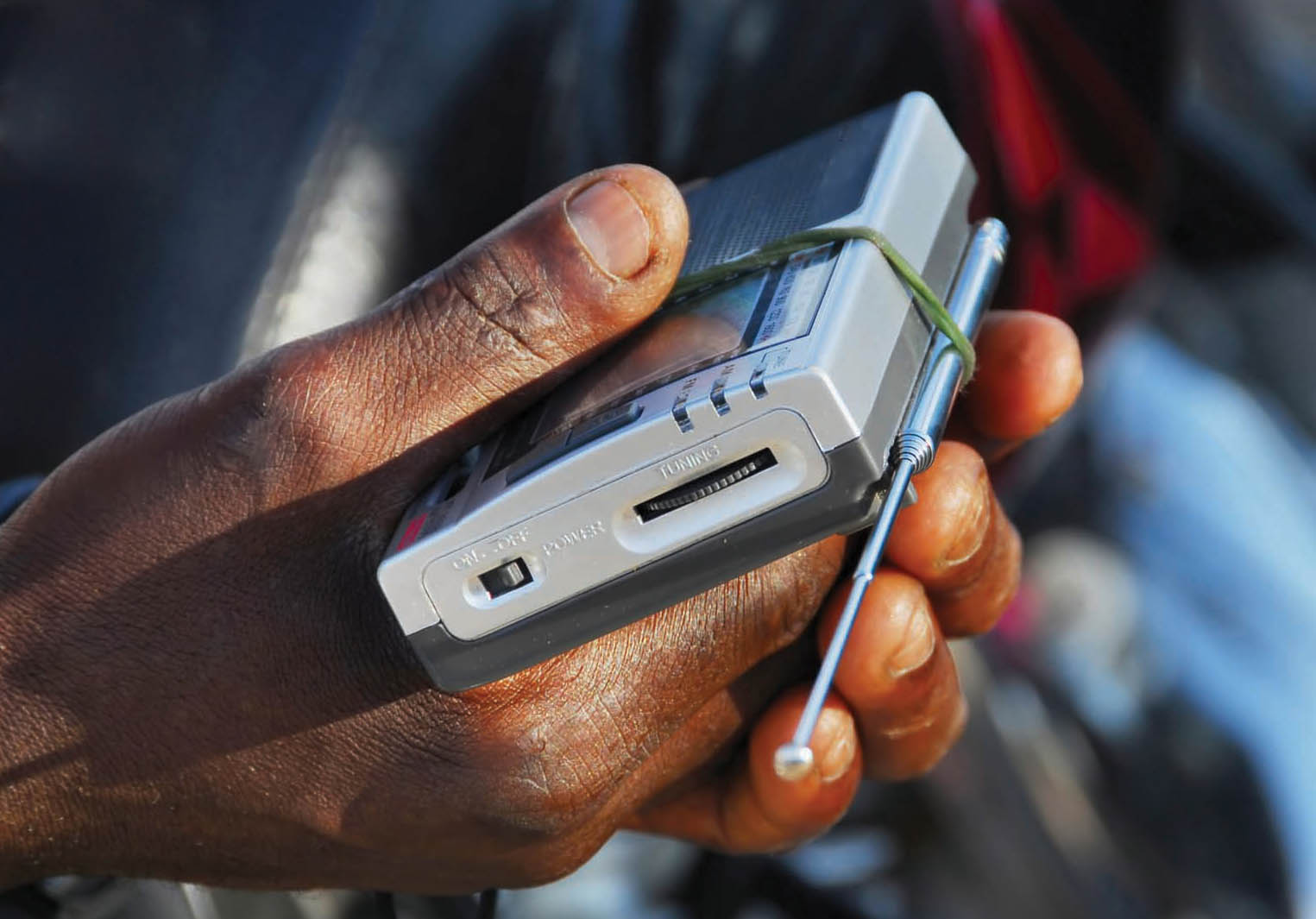 |
| HCJB gave it’s first broadcast on Christmas Day, 1931, before radios were prevalent in country. Today, radio is the most widely available medium for spreading the Gospel. |
Nearly nine decades after Clarence Jones began using radio to reach the lost, Reach Beyond is still seeing changed lives through radio broadcasting.
When the Lord called Clarence Jones, and his wife Katherine, to go to Ecuador as missionaries, Clarence knew he was going to use the relatively new medium of radio as a way to proclaim the Gospel to the unreached. On Christmas Day, 1931, Radio Station HCJB aired its first program. Clarence only knew of 5 or 6 radios in the entire country at that point. That was bold, pioneering faith. Little did he know how launching this radio station would lead to broadcasting the Gospel in languages all over the world.
Radio was the innovative new tool in Clarence’s time. But what about now? Surely with the arrival first of television, and then the internet, the reliance on radio as a ministry broadcast tool is antiquated?
On the contrary, radio is still as relevant as ever. Whether it is the taxi cab driver tuning in to one of our partner stations in Africa, the isolated individual tuning in for hope in Asia, or the mother in the Middle East keeping a station on while she cleans the house, radio is still part of our lives, and a very necessary part of Reach Beyond's toolbox.
Thanks to technology, the tool can take on different formats: planting new radio stations to reach local communities, broadcasting shortwave across continents, or utilizing digital radio to stream the Gospel through apps and websites. All radio formats have a place in today’s mission field.
Proclaiming the Gospel Behind Closed Borders
Jesus commanded His disciples (and us) to go and make disciples of every people group. He said in Matthew 24:14 (ESV), “And this Gospel of the kingdom will be proclaimed throughout the whole world as a testimony to all nations, and then the end will come.”
If our job is to make sure the Gospel is shared with every nation and people group, what do we do when there are nations and people groups we can’t reach? As much as 60% of unreached people groups live in countries closed to missionaries from North America. One way we can still gain access is through radio.
Like in the days when Reach Beyond used shortwave radio to broadcast the Gospel from Ecuador into the Soviet Union, today Reach Beyond uses radio to strategically reach places where our missionaries cannot go. Out of the Kununurra broadcasting location, Reach Beyond Australia is able to use shortwave radio to broadcast in nearly 30 languages to countries throughout Asia Pacific. We have the potential to reach 442 unreached people groups and 939 million people, most of whom live in countries completely closed off to missionaries.
 |
In other areas, we may not be able to send in missionaries, but we can help plant radio stations that are run by local believers. We can provide equipment, broadcast training and other technical expertise.
Toffer King, a Reach Beyond radio planter, explains, “National partners working in radio don’t always have the same stigma in their context as those doing other forms of mission work. By having local partners operate the station, we can be involved in places where a foreign presence directly involved with media would be suspect to a community, or even illegal.”
In 1985, Reach Beyond (then HCJB World Radio) committed with other missionary broadcasters to provide every man, woman and child the opportunity to turn the radio on and hear the Gospel of Jesus Christ in a language they could understand. It was a time of growth for the ministry, with concentrated effort on launching new radio programming for languages not yet represented. One of the languages identified at the time was from Central Asia. Reach Beyond started a partnership to build an AM radio studio in country. Soon after, all of our missionaries were kicked out of the country as borders closed to foreign evangelism. However, we had hired a local young man to continue working in the studio. While a foreigner would not have been able to share the Gospel with this people group, this young man had the opportunity to share with his own people.
Over the years, the tools used in this country have changed, but the messaging has not. David, a Reach Beyond regional director, has seen the importance of trying new media, moving from the original AM station to digital media. “There are so many choices even for radio, we have to compete in almost every market with maybe dozens of choices,” he says. “It is a reminder that content is king. It’s not the technical part of radio, it’s the content that delivers to an audience. That will always be the same.”
The choice was made to switch to a mobile app for the radio programming. Besides wanting to embrace new technology to reach the next generation, the mobile app had an additional benefit: it is very difficult for the government to block an app. We have networkers in country that help people to find the app, and content is produced in country by pastors. Christian volunteers help to follow up on engagement from listeners that come in through social media and online.
“The programs cover everything. Locals produce the content at great risk to their lives. They record at night in a studio house our partner owns with us. We are vigilant about security, but we take advantage of this opportunity. We never know when this will be closed off, when the government will find them. But we know we have a door open now. The programming is changing lives,” David said.
Still the Most Used Source of Information
Not only can radio help gain access to closed countries, but it can also help reach populations where literacy is a barrier. An estimated one billion adults are considered illiterate, with the highest concentrations of illiteracy in the Arab states, South and West Asia and Sub-Saharan Africa. Despite literacy, 70% of the unreached peoples of the world are considered oral learners, not written.
 |
“Radio doesn’t require the listener to be tech-savvy or well-educated. Hand them a pre-programmed radio and they can be illiterate or blind, never formally educated, rich/middle-class/dirt poor – as long as they can find the power button they can be reached,” said Toffer.
While radio isn’t the only medium available to help overcome illiteracy, it is the most widely available. The United Nations cultural agency UNESCO asserts that radio currently reaches 70 percent of the population worldwide. “Radio still remains the medium that reaches the widest audience worldwide, in the quickest possible time,” their statement said. Because radios have been around for 100 years, most homes have them. In developing countries, 75% of households have access to radio. While 50% of the world’s population still doesn’t have internet, and mobile reception can be spotty or absent, a radio signal will get through.
“For most people outside the developed or first world, radio is still their go-to for news, information, advocacy, entertainment, reassurance and even friendship. This is especially true anywhere outside of major urban areas,” said Janice Reid, a Reach Beyond media trainer. “Since a huge proportion of the developing world still lives in small towns or country areas, radio really is vital as a lifeline for them, particularly where internet is patchy or expensive. Where else can they turn if they can’t afford a TV?”
Radio as Discipleship
It’s not enough just to make the Gospel available to all peoples. Jesus commanded us to go and make disciples of all people. So, what does that look like with radio?
While radio can be a powerful tool for introducing new believers to Christ, it can also be a powerful tool for continued discipleship, whether that is through the content used on air, the community that forms around a station, or the follow-up that happens when listeners reach out.
In an Indonesian town, the announcer of a popular counseling program has gained quite a following among his listeners, many of whom are not yet Christian. When his mother died a year ago, none of his extended family were able to come to help with the funeral arrangements. He mentioned this on his program, and many listeners gathered to help him with the arrangements—even paying the funeral costs! His faithfulness in helping strangers over the radio has forged strong relationships, giving him an opportunity for personal witnessing and discipleship.
 |
Our digital media partner working in the Arab-speaking world includes discipleship as part of their model. Listeners first hear the Gospel through the broadcasts, but then they have an opportunity to reach out and ask questions through social media. Local Christians who speak their heart language are able to follow up to answer these questions and help lead people to Christ. Without first having the content on air, though, the door would not be open for a personal witness.
By providing content that helps listeners understand the Word and apply God’s direction to everyday life, radio can help new Christians grow in their faith even without personal follow-up. In places where there are few well-trained pastors, false teaching is very prevalent, and there’s a real need for good Biblical teaching. One station in Indonesia has a weekly show, “What Does the Bible Say?” Most of the station’s programs are aimed at people who do not profess faith in Jesus, but this one is designed to help people move beyond shallow faith into a true understanding of the Word. The pastor takes questions from people in the community and uses them to introduce the topic he’ll teach about that week.
In one of our security-sensitive countries, our 24/7 mobile radio station broadcasts programs on everything from dating to finances. A local businessman had operated a small family business for many years, selling souvenirs to tourists. He was a Christian and a long-time listener to the radio programming. His favorite program was about doing business. “I love it not just because I do business,” he said, “but because your programs talk about real situations in context of Christian life and Biblical position.”
One issue he had always dealt with was the corruption of owning a business in this country. Bribery or “gift-giving” is an expectation as it is part of their culture. After listener requests, the station did a program about bribery. The businessman was able to use the arguments presented in the program and held his ground that although he would certainly pay required taxes, he would no longer pay these illegal bribes.
“The officials were very angry and threatened me, but six months later, they still haven’t done anything to hurt my shop,” he said. “Now I sleep better knowing I’m not doing things that are bad in God’s eyes.”
Broadcasting Light Into Darkness
Leonard* lived his life in darkness. He would beat his wife and kids whenever he was drunk. And he was drunk almost every night. It was the way of life in his community. Men spend their day working hard to earn an income, and they spend their night relaxing with their friends and drinking alcohol. But, ten years of this rhythm started affecting his health. His hands started to shake, and his liver and nervous system became very unstable.
“I became emotionally unstable, too,” he says. “I didn’t want to admit my role in causing these problems. I blamed my family. I had to work for them; all of the stress was because of them. It sounds strange now, but at the time I was really sure of this.”
One evening, he came home after a long day of work and drinking. There was a dirty plate on the kitchen table, and it set him off. “I was very angry, and I threw the plate right into my nine-year-old son’s head. The plate cut open his head, and there was blood. He was crying, not understanding. My wife was screaming and my young daughter just ran out of the home.”
That night, Leonard’s health took the same downward turn. His blood pressure spiked and he had a heart attack. He couldn’t stand. Emergency medical response took him to the hospital, and doctors advised him to stay for three weeks.
“I was all alone. My ‘friends’ were too busy, and my family didn’t want to visit after what I had done.” Although an unbeliever, Leonard challenged an unknown God, yelling out, “God, why did you bring me into all of this? Why do you hate me so much? What have I done to you?”
Leonard had a hospital roommate who was always listening to his headphones, but he heard this outburst and asked him why he was blaming God. After explaining the situation, the roommate said, “All of your problems are not because of God, but because of you, brother. Only you are guilty in this, not God. But only God can help you with it.” He handed Leonard his headphones and said, “Just listen for half an hour. This is the only way I can help you.”
Reluctantly, he took the headphones, and he started hearing radio programming from one of Reach Beyond’s partner broadcasters. Before he knew it, three hours had gone by. “It was really strange. People were speaking about simple things in simple language. There was good music, and it was the first positive thing I had heard in a long time.”
Over the next couple of weeks, Leonard continued to listen. “I was like a sponge, absorbing everything. I prayed with them, I sang with them. I was listening and was happy. I didn’t recognize myself.”
Leonard discussed what he was hearing with his roommate, who helped lead him to Christ. He says, “I’ll be honest – it was a very easy decision, because I’ve seen my own example. I confessed not only to God, but also to my wife and kids, and now I’m at home, living in peace and love – thanks to the Lord, Jesus!”
Three hours of listening to the radio changed Leonard’s life. And there are many more stories like this, of people trapped in darkness, living in countries closed to the Gospel, closed to missionaries. But radio can still travel in and make an impact. With each life changed, each decision for Christ, darkness can turn to light.
This is why Reach Beyond does radio. This is why radio is still relevant in reaching the unreached.
*name changes for security
Sources: Joshua Project, UNESCO World Radio Day,
The Center for the Study of Global Christianity
